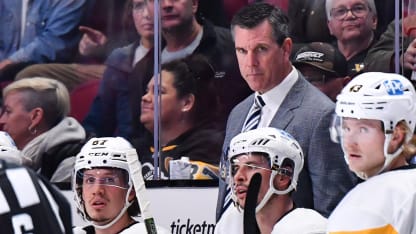NHL.com staff writer Mike Zeisberger has been covering the NHL regularly since 1999. Each Monday he will use his extensive network of hockey contacts for his weekly notes column, "Zizing 'Em Up.”
TORONTO -- If anyone has the solution to stopping future Hall of Famer Sidney Crosby, it has to be Mike Sullivan, right?
Sullivan is the coach of the Pittsburgh Penguins. Since being named to that post Dec. 12, 2015, he’s seen pretty much every game, every practice, every line rush the Penguins captain has been involved with in that time.
Come Feb. 12-20, however, friends will become foes for the 2025 4 Nations Face-Off, the first best-on-best tournament since the World Cup of Hockey in 2016. Crosby will play for Canada. Sullivan will be coach for the United States. His task when the two teams meet at Bell Centre in Montreal on Feb. 15: find a way to neutralize its No. 87.
Question is, how?
“I’m not sure I have an answer for that,” the 56-year-old said with a chuckle.
Fortunately, Sullivan had plenty of other answers on all things 4 Nations Face-Off during an exclusive Q&A with NHL.com on Saturday, including getting another shot at coaching the United States, scouting potential candidates on opposing teams while he’s behind the Penguins bench and how deep a roster the U.S. potentially will have.
First off, the first six players named to your roster are forwards Auston Matthews (Toronto Maple Leafs), Jack Eichel (Vegas Golden Knights), Matthew Tkachuk (Florida Panthers), and defensemen Adam Fox (New York Rangers), Charlie McAvoy (Boston Bruins) and Quinn Hughes (Vancouver Canucks). The remaining spots will be named on and around Dec. 1. When you look at what your roster could potentially look like, with the likes of the Tkachuk brothers (Matthew, Brady), the Hughes brothers (Quinn, Jack), Matthews, Jake Guentzel, Connor Hellebuyck, Jeremy Swayman… the list goes on and on … could this possibly be the deepest talent pool the United States has had at every position?
“I think so, when you look at what the potential roster might look like. The amount of players the United States has produced at such a high level, I think it’s exciting, the prospect of what the team might look like. I also think it’s a tribute to hockey in the United States and the impact the NHL has had on some of the markets they’ve gone into. From a pure numbers standpoint, there’s more kids participating in the game than ever before. And I think the work that’s been done at the grass roots level, whether it would be volunteers, or moms and dads who take their kids to the rink every day to play the game that they love, we’re the eventual benefactors of that because I think we end up the sheer numbers of elite players at every position. I think that’s the byproduct, right? So, I think in many ways it’s a celebration of hockey in the United States and I think we’re the utility benefactors, so we’re excited to see what our team might look like.”
You’ve said you had that same excitement after you were named coach of the United States’ Olympic team for the 2022 Beijing Olympics. Ultimately, the NHL understandably pulled out because of concerns related to the COVID-19 pandemic. Even though you’ve said it was obviously the right move, how crushing was it that you couldn’t finish what you’d started?
“It was incredibly disappointing because we had done so much work up to that point in building up our roster as a coaching staff. We were so far down the road in putting that Olympic team together. We all knew the circumstance and potentially what may occur. But we were so far down the road, and we were all so excited at the opportunity to represent our nation. It’s just an incredible honor. So, ultimately a decision was made that the NHL wouldn’t participate, and you can’t help but be disappointed. So, that was a tough pill to swallow for all of us. I think what made it difficult is how much work we’d put into the process at that point. But we also understood that was potential reality.”
Given what happened at that time, did you ever think you’d get another chance to coach the best your country has to offer?
“I wasn’t sure. As you know, there are no certainties in this game, and I wasn’t sure I’d ever get an opportunity to participate in that event again. I wasn’t sure the NHL would participate in an event like that again. It literally could have been an experience that comes once in a lifetime, which is why we were as disappointed as we were.”
And then United States general manager Bill Guerin reached out and offered you the chance to coach the United States at both the 2025 4 Nations Face-Off and the 2026 Milano Cortina Olympics. What was your reaction when that call came in?
“Incredible. When Billy called me and asked me to be coach this time around, I can’t tell you how excited I was. Like I told Billy at the time, it’s an incredible honor. There are a lot of really good American-born coaches who participate in the League who are very worthy to be the head coach to represent the United States, so the fact he asked me was an incredible honor. It’s one I don’t take likely. And we’re going to do everything we can to put our best team on the ice, and so we’re excited about it.”
Finally, how much are you informally scouting potential roster candidates for the United States from NHL opponents on nights the Penguins are playing them?
“Of course, without a doubt, we’re doing that. Obviously when we’re playing games, my priority and focus is on the Pittsburgh Penguins. But when we’re playing teams that have players who potentially could be playing for the U.S., we’re certainly well aware of those players and where they fit on the depth chart. We’ve already done a lot of work this time around for the 4 Nations event coming up. Billy has done a really good job putting together a management team and coaching staff that is so excited about this experience. We’ve put in a lot of work from a process standpoint, a similar process we did with the Olympic team the last go around. It’s fun in so many ways. We’ve been doing this since late May. So, when we’re playing these teams around the League, of course we’re paying attention to candidates and what they could potentially do."


















